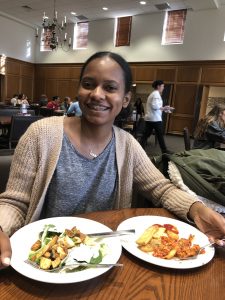As I have mentioned in the previous entries, the meat industry is full of unethical practices. For years the industry was able to keep these unethical practices hidden, however, articles, books, and documentaries have brought them to light.
The factory farming industry is focused on maximizing its output and minimizing its cost of production, to gain the most profit. This especially applies to the U.S. meat and poultry industry, which aims to make its products faster and bigger. One of the ways the industry tries to minimize its costs is by feeding animals, such as cows, corn. The U.S. government subsidies corn, as a result, farmers produce and sell corn at really cheap prices. These meat companies then feed it to cows, that are designed to eat grass. When cows are fed corn, dangerous mutations can occur and in some cases, the bacteria E. Coli evolves. This deadly bacteria can easily spread from one cow to another since these animals are kept in crowded and filthy feedlots. E. Coli can also contaminate vegetables such as lettuce and spinach because of runoff from factory farms. In addition, ground beef at the grocery store has thousands of cows mixed up in it, which increases the likelihood of the meat being contaminated with a disease.
To meet with the demand for Chicken, companies are raising them in half the time, but making them double the size they were in the 1950s. Scientists have also designed chickens to have larger breast because white meat is popular. Chickens are fed a diet of genetically modified feed, they are given antibiotics and other growth enhancers. This leads them to grow so big that their bones can’t keep up with their weight and they are unable to move. The chickens live in horrible conditions, they are kept in crowded cages and they often have no access to sunlight. Their condition provides breeding grounds for bacteria and mutations.
Furthermore, meatpacking is one of the most dangerous jobs in America and it is done by a lot of undocumented immigrants and poor people of color. They are often exposed to infections and diseases. Workers also suffer from a high number of injuries.
One should consider these factors when they go to the grocery store to purchase meat. They should consider their health, their family’s health, the mistreatment of meat industry workers, the environmental pollution and the suffering of animals. Throughout my personal project, I have learned that the process of changing to a vegetarian or vegan diet is challenging, but it is worth a try.
Citations
Food, Inc. By Robert Kenner, Robert Kenner, Robert Kenner, Richard Pearce, Eric Schlosser, Eric Schlosser, Melissa Robledo, William Pohlad, Jeff Skoll, Robin Schorr, Diane Weyermann, Elise Pearlstein, Elise Pearlstein, Kim Roberts, Kim Roberts, Michael Pollan, Michael Pollan, Gary Hirshberg, Joel Salatin, and Mark Adler. Directed by Richard Pearce.
